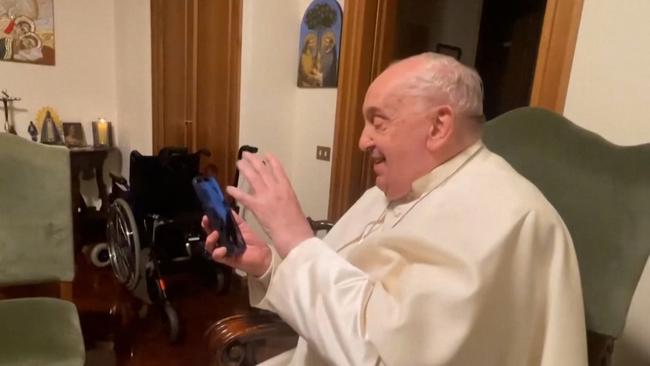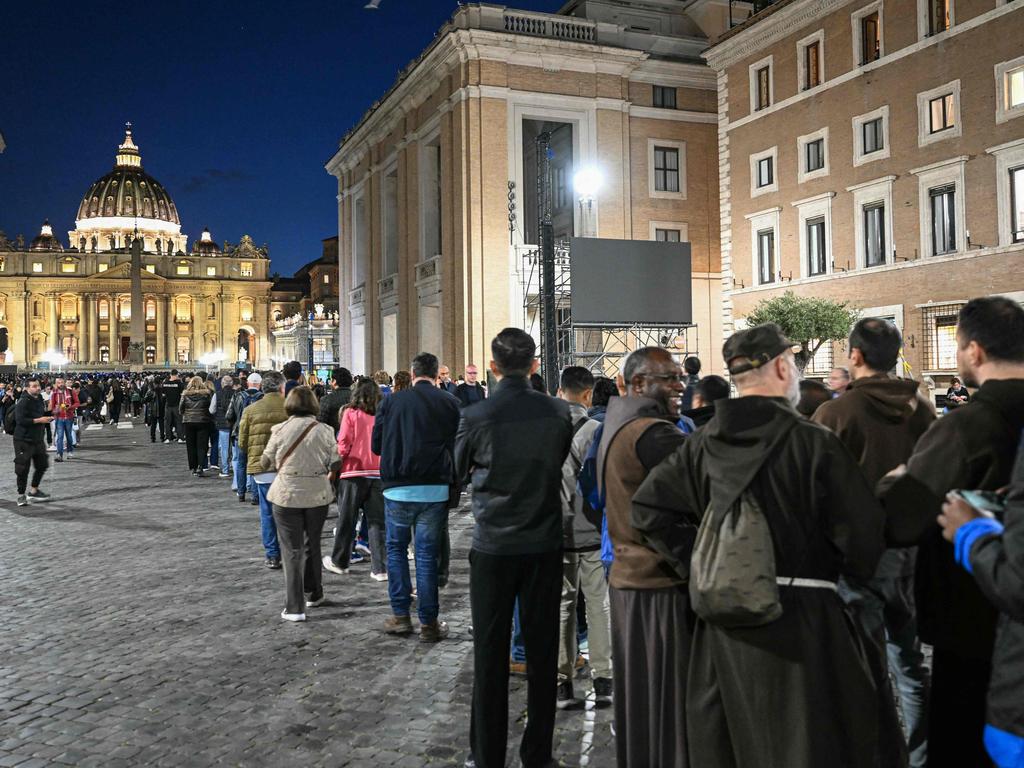Pope Francis kept up routine of calling Gaza until the end
His calls were a source of comfort and protection, according to the small Christian community sheltering around a church compound.

Even as he was dying, Pope Francis kept to a routine that had become a near-daily ritual for him over the past 18 months: calling the only Catholic church in Gaza.
On Saturday, two days before his death, he phoned the parishioners of the Palestinian enclave’s Holy Family Church at precisely 8 p.m. local time. He did so throughout the war between Hamas and Israel, even when he was sick or hospitalized.
To the roughly 450 Palestinian Christians who have taken refuge inside the church, nestled in the Rimal neighborhood of Gaza City, the pope’s video calls represented a lifeline and a source of hope and strength. Parishioners would ask him to give a blessing for their sick and elderly, for their children and newborn babies through the cellphone screen.

Now, they and other Gazans are grappling with the loss of the pope, who seemed to be one of the only world leaders who never forgot them or their suffering.
“His calls meant everything to us,” said Issa Anton, 46, a parishioner who often assisted the priests. “We were the only parish in the world that received daily calls from the pope. It made us feel less alone.” When he ran errands, Anton sometimes carried the cellphone of Father Yusuf Asad, one of the parish’s senior priests. One time, Pope Francis phoned, and Anton told him he needed an hour to get back to the church.
“He called twice or three times to check if I made it back safely,” Anton said. “He knew what was happening in Gaza. He was always up to date.” Each time he called, one of the first questions he would ask was: “What did you eat today?” On Saturday, Francis didn’t turn on his video. The parishioners understood. They knew he was ill.


“Buono sera santo padre,” the priests greeted him, as always, in Italian: “Good evening, Holy Father.” Some parishioners came closer to listen to the pope’s voice, recalled George Antone, a relative of Issa’s and the head of the church’s emergency committee.
“He asked about the daily situation in Gaza, and he made sure that we are all safe,” he said. “Then he asked us to pray for him.” Christianity has existed for centuries in Gaza, which is mentioned in the Bible several times including as the place where Samson was imprisoned and met his death. Once thriving, the Christian community in Gaza has been in decline for decades.
Before the war began, following Hamas’s Oct. 7, 2023, attacks on Israel that left around 1,200 dead and 251 taken hostage according to Israeli officials, there were around 1,000 Christians in a Gaza population of more than 2 million. Of that number, 135 were Catholics, according to the Latin Patriarchate of Jerusalem, which oversees the Gaza parish.

As war erupted, most Christians sought refuge in either the Holy Family Church or the Church of St. Porphyrius, a Greek Orthodox church. They remained despite Israel’s orders to evacuate the areas, and the church agreed to protect them, Antone said.
The Orthodox church was hit by an Israeli airstrike in October 2023, killing more than a dozen people sheltering there, according to the Greek Orthodox Patriarchate of Jerusalem and Palestinian health officials. Israel’s military said at the time that the church wasn’t the intended target and that its jets were trying to destroy a nearby Hamas command center.
The Holy Family Church has been struck by shrapnel from Israeli strikes on nearby buildings. In July, the parish’s school was bombed, killing four displaced people, the Latin Patriarchate of Jerusalem said at the time, condemning what it said was an attack on a place of refuge for hundreds of civilians. The Israeli army said at the time that the complex was a Hamas hideout.
Antone and his family fled to the church shortly after the war erupted. In December 2023, two of his female relatives were shot by an Israeli sniper inside the church compound, an attack that spurred Pope Francis to speak out, saying there were no terrorists in the church, only unarmed civilians. The Israeli army said at the time it didn’t target civilians and was reviewing the incident.


Hamas has generally tolerated Christians since it seized control of Gaza in 2007. The community has freely practiced its religion and observed religious holidays, while Christian charities and churches continued to operate. But there have been reports of Hamas militants kidnapping Christians and forcing them to convert.
Around 50 Christians have either been killed in airstrikes or crossfire or have died from disease or lack of medication since the war started, Antone said. More than 51,000 people in Gaza have been killed during the war, according to Palestinian health authorities, who don’t specify how many were combatants.
Today, there are roughly 650 Christians left in Gaza, with around 200 sheltering at the Greek Orthodox church or still living in their houses, Antone said. The rest live inside the compound of the Holy Family Church.
For the Christians who still live in their homes, coming to one of the parish’s two daily prayer sessions is risky. With no fuel or transportation, they brave crossfire, snipers and possible airstrikes to walk to the church.

Francis’ regular calls were a window into his character. Parishioners also said the contact kept them relatively safe. There have been no direct airstrikes on the church by either Israel or Hamas throughout the conflict. The church remains intact, though parts of its annex are damaged.
“That was one of the major reasons we were not attacked,” Antone said. “We had a father who was asking about us, who was taking care of us.” In one video of a call from earlier this year, the pope made funny gestures with his hands and face for a parishioner’s small child. When Yusuf told him they would all pray for him, Francis joked, “Pray in my favor, not against me.” At first, the parishioners couldn’t believe the news that Francis had died. They had just spoken to him on Saturday and saw his Sunday Easter sermon, where he called once again for a cease-fire in Gaza. Then, it finally sunk in.
“It’s like you have lost your father and you will not hear from him again,” Antone said. “We miss his voice and his sense of humor. We will miss his protection, of course.”
The Wall Street Journal



To join the conversation, please log in. Don't have an account? Register
Join the conversation, you are commenting as Logout